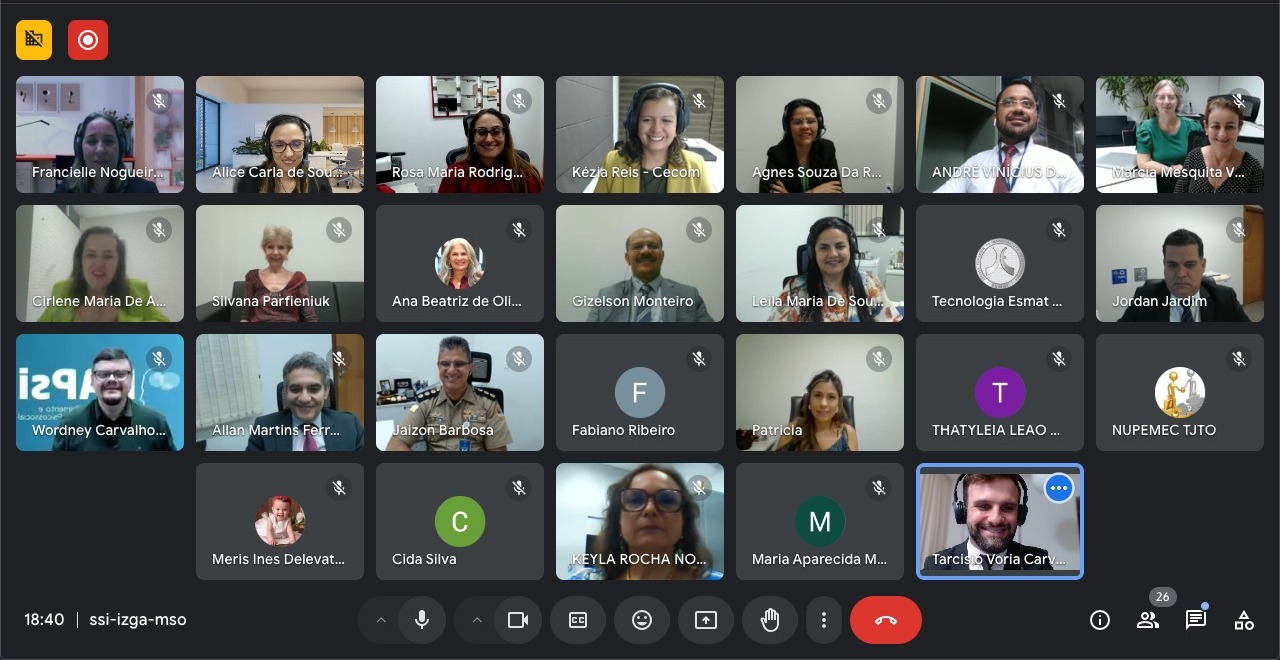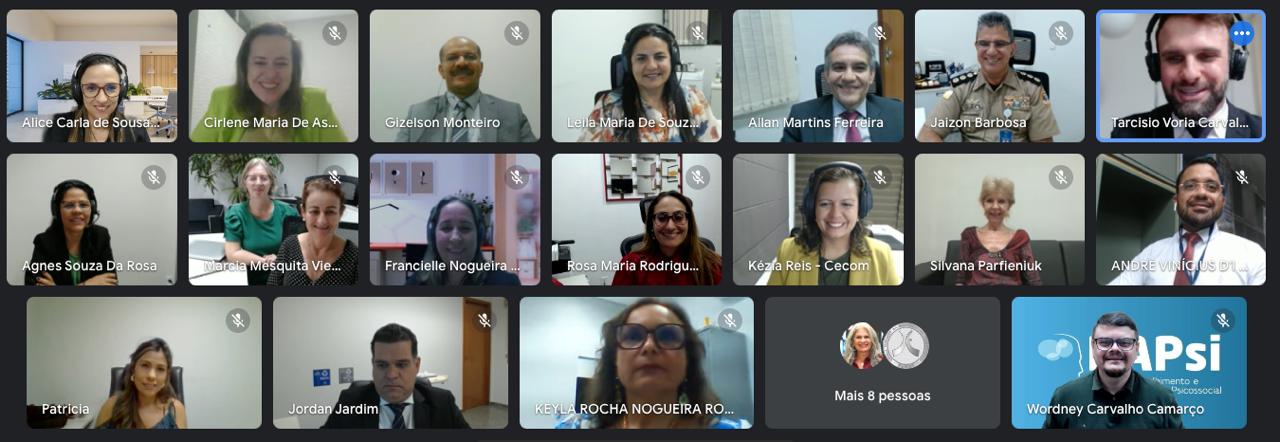
A unified public administration aimed at efficiency, transparency, the optimization of resources and quality services to citizens was the focus of the live of the Committee for the Integration of Judicial Policies (CIPJ) held on Monday (September 30th), via the YouTube channel.
The live was attended by magistrates and civil servers and it was opened by the coordinator of the Committee for the Integration of Judicial Policies (CIPJ), assistant Judge to the President, Rosa Maria Rodrigues Gazire Rossi, who spoke about why the CIPJ was set up, the work carried out by its members and its objectives.
The Judge emphasized that the Committee emerged in the administration of 2023/2025 to align internal communication among the Presidency, the General Internal Affairs of Justice (CGJUS-TO) and the Superior School of the Judges of the State of Tocantins (Esmat) and the administrative and judicial units. “Committees and centers didn't communicate with each other and neither did the judicial units communicate with the administrative units, making it inefficient,” she said, noting that in order to achieve the same public policy, the Judiciary has to be one for the benefit of society.
The coordinator also explained that the Committee was not created to hinder autonomy or innovation “but to align our communication so that the result is positive, to gain quality of life because this saves time, and also to be more sustainable”, which is why she recalled that the CIPJ is made up of several representatives.
Presentation of projects
Agnes Souza da Rosa, an employee of the Strategic Management and Statistics Coordination Office (Coges), explained the step-by-step on the flow of project approvals, established in an ordinance and available on the website of the Court of Justice of the State of Tocantins. Still on the subject of projects, the coordinator of Social and Environmental Management and Social Responsibility, Leila Jardim, stressed the importance of everyone being aware of the Sustainable Development Goals, the Social Development Index and the Sustainable Logistics Plan (PLS). Server João Ornato spoke about the Annual Contracting Plan and the Finance Director spoke about the Annual Budget Law, emphasizing that planning is necessary because the budget is always weighed before execution.
CGJUS and Esmat
Representing the CGJUS-TO, assistant Judge Arióstenes Guimarães recalled that the Judiciary is not only focused on judging cases. According to him, “we are all faced with a series of demands that are the product of the several public policies”, with the Judiciary as the executor or promoter, so actions must always be institutional and not personal.
“The idea of public policy can't be personal; it can't be the view of just one district. We need to focus on this way of working and it's not static, it's dynamic. That's why the Committee is broad and heterogeneous”. The magistrate also stressed that all the initiatives thought up in the district should be shared “integrated initiatives can give us breadth, avoid waste and allow us all to engage in a transparent dialog internally but also with society”.
Executive Director of Esmat, Ana Beatriz de Oliveira Pretto, made it clear that the School is focused on training and, in this sense, explained how the courses are selected, always prioritizing those that meet various indicators in order to maximize results. With regard to events, she stressed the need to consolidate them, since when they are spread out they end up not reaching their target audience. She also pointed out how speakers are hired and the requests made by other institutions to take part in congresses and courses.
Projects in the judiciary
The projects developed by the Permanent Center for Consensual Methods of Conflict Resolution (Nupemec), such as the Workshop on Divorce and Parenting, Over-indebtedness, the Virtual Counter, Mobile Justice, among others, were presented by the coordinating Judge, Silvana Maria Parfieniuk.
All the public policies implemented by the Judiciary to prevent and raise awareness of domestic violence, such as the Red Light, PaHS and Week of Justice for Peace at Home, were presented by Judge Cirlene Maria de Assis, who is in charge of the State Coordination for Women in Situations of Domestic and Family Violence (Cevid).
The Coordination for Children and Youth (CIJ) was represented by Judge Adriano Gomes de Melo Oliveira, who spoke about the Permanent National Program to Support the Deinstitutionalization of Children and Adolescents in Foster Care and those who have left Shelters - the New Paths Program/CNJ, which aims to guarantee a promising future for young people in foster care, offering essential tools for these young people to build their autonomy and independence, opening doors to a full and meaningful life.
Isabela Solé, from the State Judicial Commission for Adoption of the State of Tocantins (Ceja/TO), spoke about the National Adoption System and the A.DOT Program - an application for the adoption of children and adolescents.
The projects aimed at the quality of life of magistrates and civil servers were presented by the Director of People Management, Márcia Mesquita, such as the services provided by the Health Center, gymnastics, the Justice Race, among others. The work of the Multidisciplinary Teams Management Group was explained by coordinator Jocelaine Dalanora.
Server André Vinícius showed the workflow of the Inovassol Innovation Center, created in May of 2023 with the publication of the Resolution No. 9, which established the Innovation Policy within the scope of the Judiciary of the State of Tocantins.
Institutional agenda and integration panel
One of the concrete actions of the Committee for the Integration Policy of the Judiciary is the institutional calendar, which lists all the events and commemorative dates on the website of the TJTO. The Director of the Communication Center (Cecom), Kézia Reis, showed the calendar (just click here) and explained that the data from the units is passed on to Cecom, which feeds the system, thus aligning and unifying the strategies of the Judiciary and facilitating institutional communication among the areas. Still on the agenda, the Director of Information Technology (Dtinf), Alice Sétubal, emphasized the importance of using Google Workspace for greater efficiency and support in services for all users.
Another tool created by the Committee is the Integration Panel, which is now available and was presented by employee of Coges Francielle Braga. With this resource it is possible to locate all the information on the Committees and Commissions that belong to the PJTO.
To end the live, the Director of Dtinf, Alice Sétubal, showed those present the Flow and Panel for Prioritizing Demands.




